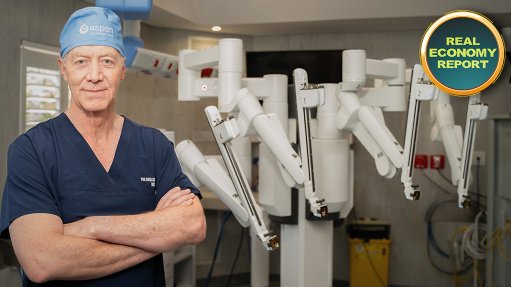
From Creamer Media in Johannesburg, this is the Real Economy Report.
Sashnee Moodley:
The Urology Hospital in Pretoria in March celebrated 3 500 procedures done with its Da Vinci robot, after having been the first hospital to acquire this type of surgical robot in South Africa in 2013. Marleny Arnoldi visited the hospital.
Marleny Arnoldi:
The Urology Hospital recently acquired the latest Gen 4 X model In the Da Vinci robot range, replacing the Gen 3 predecessor. Urologists and surgeons such as Dr Lance Coetzee uses the robot to assist with prostatectomies and other types of surgeries, and has become a standard of care for patients undergoing prostate cancer surgery.
The 900 kg fourth-generation Da Vinci Robot provides improved magnification and greater precision during procedures. It comprises four arms that are each able to move independently. Coetzee tells us more about the benefits for surgeons using the robots.
Urologist and surgeon Dr Lance Coetzee:
Marleny Arnoldi:
The procedures done robotically at the urology hospital include cancerous prostate removals, cancerous kidney removals, reconstructive kidney surgery and peliv organ prolapse treatment surgery.
Because the robots allow for ease of work in smaller areas and are much less intrusive to patients, it allows for a shorter recovery time and reduces levels of post-operative side effects, compared with conventional open surgery. Coetzee shares some of the benefits to the patient.
Urologist and surgeon Dr Lance Coetzee:
Marleny Arnoldi:
More than 12-million procedures have been done globally using the Da Vinci robots, with more than 70 countries currently using them. There are two more Da Vinci robots operating at hospitals in Gauteng, two in Port Elizabeth and four in Cape Town.
To operate the robot requires extensive training. Coetzee unpacks the rigorous training process and where it happens.
Urologist and surgeon Dr Lance Coetzee:
Marleny Arnoldi:
The robots are able to detect potential faults or errors on its own and warn the operator before the machine starts operating, or even during operations, without causing harm to the patient. Coetzee hopes that more surgeons will embrace this non-invasive technology. He tells us whether the Urology Hospital in Pretoria plans on acquiring more machines.
Urologist and surgeon Dr Lance Coetzee:
Sashnee Moodley:
That’s Creamer Media’s Real Economy Report. Join us again next week for more news and insight into South Africa’s real economy. Don’t forget to listen to the audio version of our Engineering News daily email newsletter.